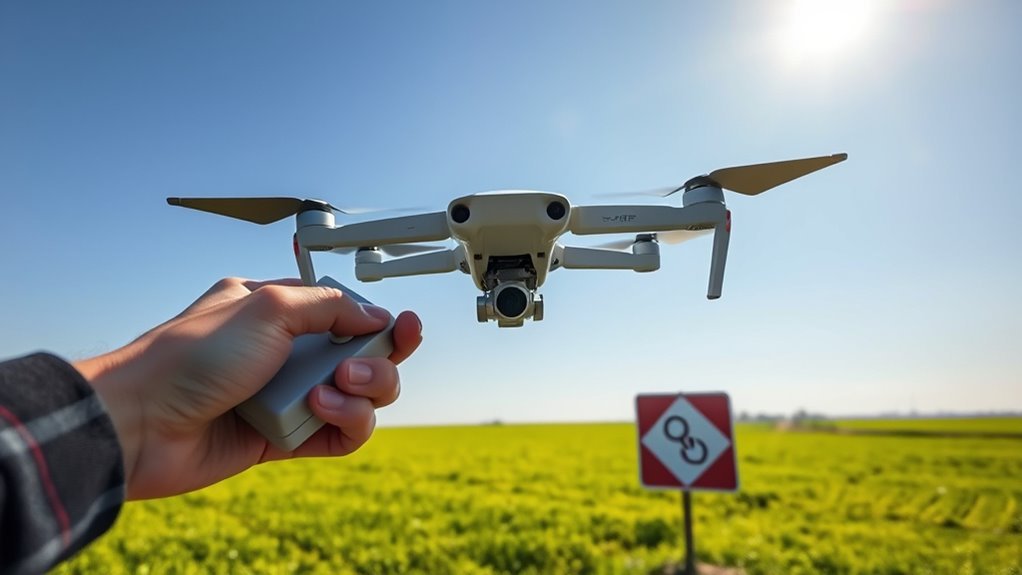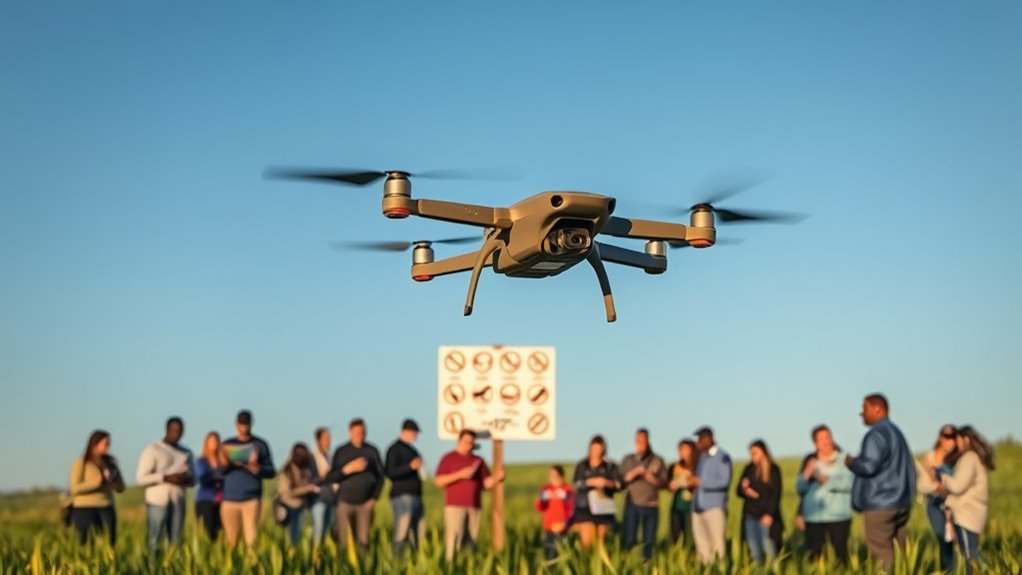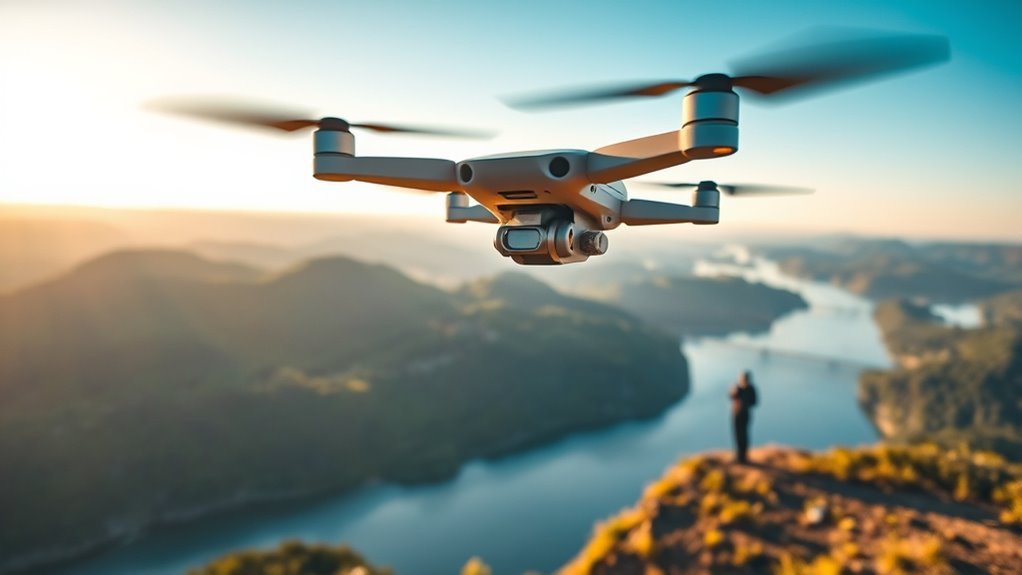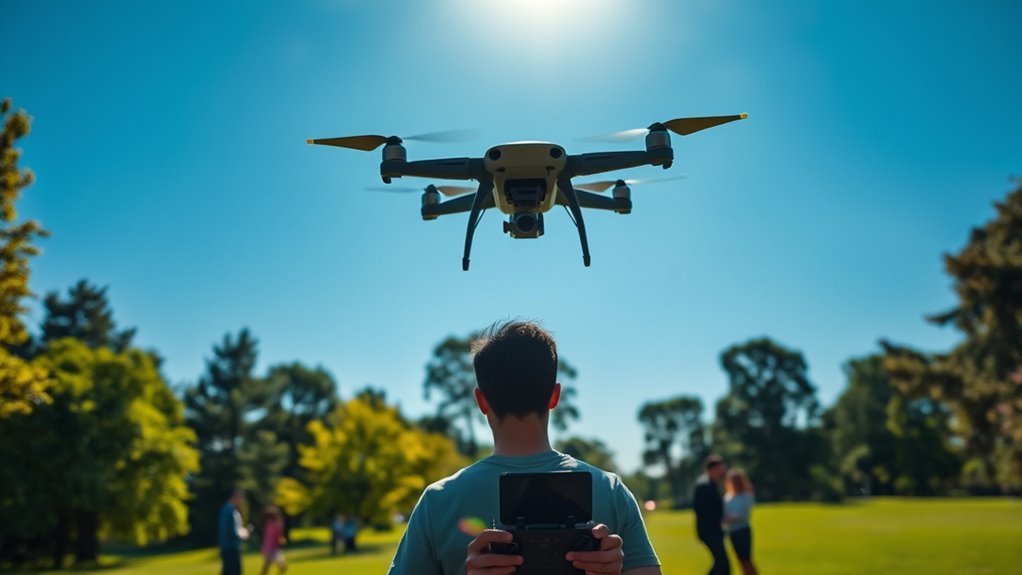Yes, you usually need a license to comply with drone regulations, particularly if you’re flying commercially. The FAA requires a Remote Pilot Certificate for commercial operators, while recreational flyers often don’t need a license but must adhere to specific guidelines. Ignoring these regulations can lead to serious legal and financial consequences, including hefty fines. So, understanding the intricacies of drone licensing is essential, and there’s much more to take into account when flying legally and safely.
Understanding Drone Regulations

As you navigate the complex landscape of drone regulations, it is vital to grasp the foundational rules that govern their use. Understanding these regulations is essential for anyone keen to harness drone technology effectively and responsibly. The Federal Aviation Administration (FAA) outlines specific aviation regulations that dictate where and how drones can operate. Familiarize yourself with guidelines regarding altitude limits, no-fly zones, and operational visibility. These regulations not only guarantee safety but also protect your freedom to fly. Ignoring them can lead to penalties that restrict your ability to enjoy this innovative technology. By comprehending and adhering to these foundational rules, you empower yourself to explore the vast potential of drones while remaining compliant with necessary aviation standards.
The Importance of Licensing

Licensing is essential for maintaining safety standards in drone operations, ensuring that pilots are knowledgeable about regulations and best practices. Without proper licensing, you risk legal penalties and jeopardize the safety of both your flight and those around you. Additionally, a structured licensing process enhances pilot competence, fostering a more responsible and skilled community of drone operators. Furthermore, understanding federal aviation regulations is crucial for compliant and safe drone operation. The rise in popularity of drones, like the Dji Mini 2, has made it even more important for operators to be aware of the regulations surrounding their use.
Ensuring Safety Standards
While the thrill of flying drones captivates many enthusiasts, the necessity of proper licensing cannot be overstated when it comes to ensuring safety standards. Licensing not only signifies a commitment to following established safety protocols, but it also equips you with essential knowledge regarding risk assessment. By understanding the potential hazards associated with drone operation, you can make informed decisions that prioritize safety for yourself and those around you. Additionally, adherence to licensing requirements fosters a culture of responsibility within the drone community, promoting safe practices and reducing accidents. Ultimately, obtaining a license empowers you to enjoy the freedom of flying while maintaining the highest safety standards, contributing to a secure environment for everyone involved in the hobby.
Legal Compliance Necessity
Understanding the legal implications of drone operation is essential, especially since failing to comply with regulations can lead to significant penalties. You must recognize your legal obligations, which include obtaining the necessary licenses. Ignoring these requirements not only jeopardizes your freedom to operate but also exposes you to compliance challenges that can be intimidating. Maneuvering through the regulatory landscape may seem overwhelming, yet it’s critical for ensuring responsible usage of your drone. By securing the appropriate licenses, you empower yourself to fly freely while respecting the law. This balance between liberty and legal adherence is fundamental for fostering a safe and innovative environment for all drone enthusiasts. Embrace these regulations, and enjoy your aerial pursuits without unnecessary risks.
Enhancing Pilot Competence
Acquiring the necessary licenses not only fulfills legal obligations but also enhances your competence as a drone pilot. Through dedicated pilot training and thorough skill assessment, you elevate your flying abilities, ensuring safety and efficiency in the skies.
Consider the benefits of being a licensed pilot:
- Confidence: Knowing you’ve mastered essential skills allows you to operate your drone with assurance.
- Responsibility: A license signifies your commitment to safe practices, fostering trust in your community.
- Opportunities: Enhanced capabilities can lead to exciting career prospects or personal projects that require advanced skills.
Ultimately, embracing licensing empowers you to navigate the drone landscape with freedom, skill, and confidence, ensuring that you’re not just a pilot but a responsible steward of the skies.
Who Needs a License to Fly a Drone?

Whether you’re a hobbyist capturing aerial photos or a professional conducting commercial surveys, knowing who needs a license to fly a drone is vital. Recreational flyers typically don’t need a license, but they must adhere to specific guidelines, such as flying below 400 feet and staying away from restricted areas. However, if you’re a commercial operator using a drone for profit—be it for real estate, agriculture, or filmmaking—you’ll need to obtain a Remote Pilot Certificate from the FAA. This requirement guarantees that you understand airspace regulations and safety protocols. Ignoring these rules could lead to penalties or accidents, so it’s important to be informed about the licensing requirements that align with your drone usage.
Types of Drone Licenses
As you navigate the world of drone operation, it’s essential to familiarize yourself with the various types of drone licenses available. Understanding these distinctions empowers you to fly freely and responsibly.
- Commercial Drone License: Required for those using drones for business purposes, ensuring compliance with safety regulations.
- Recreational Drone License: Designed for hobbyists, this license often has fewer restrictions, allowing for personal exploration and creativity.
- Remote Pilot Certificate: A specific certification for commercial pilots, focusing on knowledge of airspace rules and operational safety.
Each license serves a unique purpose, enabling you to achieve your aerial ambitions while adhering to the law. Embrace the freedom that comes with the right knowledge and preparation!
Steps to Obtain a Drone License
Obtaining a drone license involves a series of well-defined steps that guarantee you’re prepared for safe and compliant operation. First, familiarize yourself with the requirements set forth by regulatory agencies, as they vary by region. Next, complete any necessary training courses, which often cover safety protocols and operational guidelines. After that, you’ll need to pass a knowledge test that assesses your understanding of airspace regulations and drone functionality. Once you’ve successfully completed these steps, you can submit your application along with any required documentation. Finally, make sure you stay updated on any changes in the licensing process or regulations to maintain compliance. By following these steps, you’re not only securing your freedom to fly, but also making certain you’re a responsible operator.
Exemptions and Special Cases
While many drone operators must adhere to standard licensing requirements, there are specific exemptions and special cases that can alter these obligations. Understanding these exempt scenarios can empower you to navigate regulatory variations effectively.
- Certain educational or research activities may not require a license.
- Hobbyists flying under specific weight limits often enjoy exemptions.
- Government entities may operate without traditional licensing in certain contexts.
These exceptions can provide you with the freedom to explore uncharted skies without the usual constraints. However, it’s crucial to remain informed about the specific conditions surrounding these exemptions to guarantee compliance and avoid unexpected penalties. Embracing this knowledge can markedly enhance your flying experience while still respecting the regulatory landscape.
Consequences of Flying Without a License
Flying a drone without a license can lead to significant legal penalties, including fines and possible criminal charges. Additionally, you may face insurance coverage issues, leaving you financially vulnerable in the event of an accident. Beyond these implications, the safety risks associated with unauthorized flying can endanger both yourself and others, underscoring the importance of adhering to regulations.
Legal Penalties Incurred
Failing to adhere to drone licensing regulations can lead to significant legal consequences. If you fly without a license, you might face serious repercussions that can impact your freedom and finances.
- Legal ramifications: You could be subject to criminal charges, which may result in a criminal record.
- Financial penalties: Fines can reach thousands of dollars, putting a strain on your financial stability.
- Loss of flying privileges: Your ability to enjoy flying could be revoked, limiting your freedom to explore the skies.
Understanding these risks is vital. Ensuring compliance not only protects your rights but also enhances the safety of everyone in the airspace. Don’t let ignorance cost you; take the necessary steps to fly legally and responsibly.
Insurance Coverage Issues
Operating a drone without a valid license not only exposes you to legal and financial repercussions but also complicates your insurance coverage greatly. Most insurance types require proof of compliance with regulations, including licensing. Without a license, you may find yourself without coverage or facing limited options. Insurers often impose strict coverage limits for unlicensed operations, effectively leaving you vulnerable in the event of an accident or damage. If you’re thinking about flying without a license, consider the potential financial fallout. A single incident could lead to significant out-of-pocket expenses, and your lack of coverage could result in personal liability. Ultimately, operating legally isn’t just about freedom; it’s about protecting yourself and your assets.
Safety Risks Involved
When you choose to fly a drone without a license, you greatly increase the safety risks not only for yourself but also for others. Ignoring regulations can lead to severe consequences, including drone accidents that could have been avoided with proper training and adherence to safety measures.
Consider the potential ramifications:
- Injuries: Untrained pilots may lose control, endangering bystanders and causing serious harm.
- Legal repercussions: Operating unlawfully can lead to hefty fines or even criminal charges.
- Property damage: A drone crash can damage private property or critical infrastructure, resulting in costly repairs.
Embracing the freedom of flight means respecting safety measures, ensuring a secure environment for everyone involved.
Frequently Asked Questions
Can I Fly a Drone for Recreational Purposes Without a License?
Yes, you can fly a drone recreationally without a license, but you must follow drone safety and recreational guidelines. Always respect airspace regulations, maintain visual line of sight, and avoid flying near people or property.
What Happens if My Drone Crashes During Flight?
Like Icarus, if your drone crashes, you face crash liability depending on damages caused. Successful drone recovery can mitigate losses, but understanding insurance and regulations is essential for protecting your freedom in the skies.
Are There Age Restrictions for Obtaining a Drone License?
Yes, there’re drone age restrictions in place. Generally, you must be at least 16 years old to meet license eligibility requirements. Understanding this guarantees you can operate your drone legally and safely, maximizing your freedom.
Can I Fly a Drone in National Parks?
Around 85% of national parks have drone restrictions. You can’t fly a drone in these areas due to strict national park policies. Always check local regulations to guarantee you’re respecting wildlife and park visitor safety.
Are There Specific Insurance Requirements for Drone Operators?
When operating a drone, you should consider specific insurance policies to protect yourself. Liability coverage is essential, as it safeguards against potential damages or accidents that could arise during your flights, ensuring your freedom remains intact.

